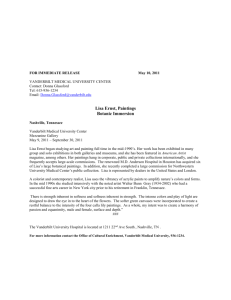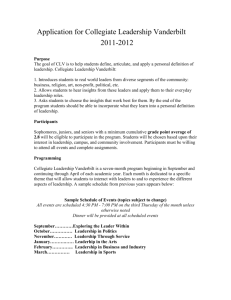VTC Annual Report 2014_External - Vanderbilt Institute for Global
advertisement
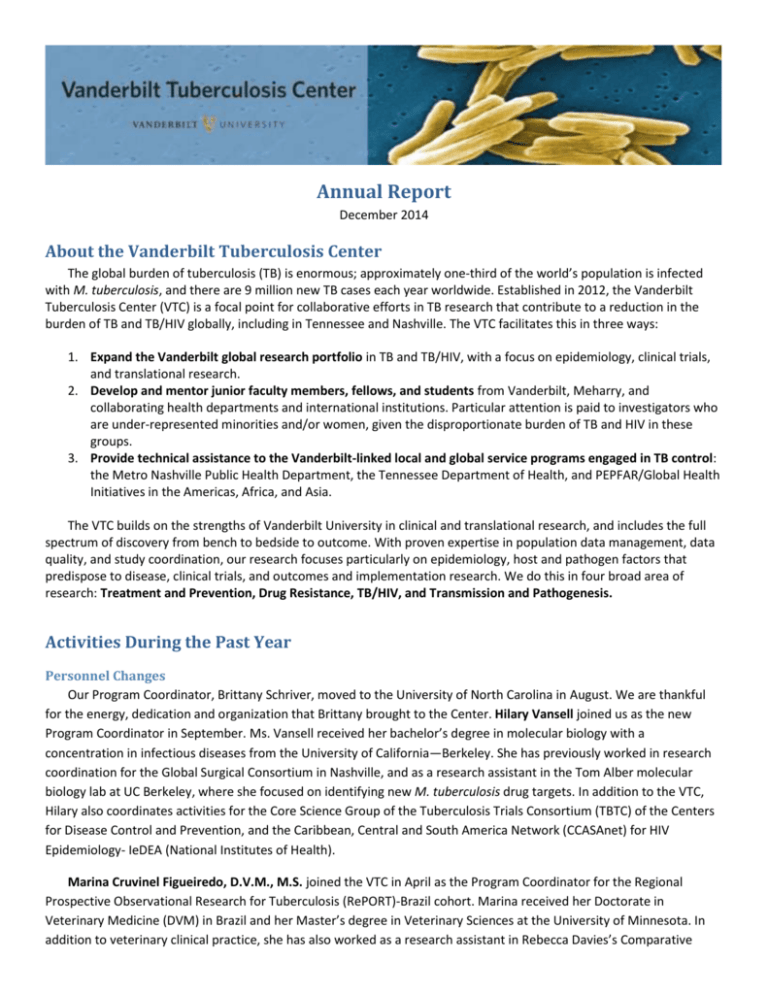
Annual Report December 2014 About the Vanderbilt Tuberculosis Center The global burden of tuberculosis (TB) is enormous; approximately one-third of the world’s population is infected with M. tuberculosis, and there are 9 million new TB cases each year worldwide. Established in 2012, the Vanderbilt Tuberculosis Center (VTC) is a focal point for collaborative efforts in TB research that contribute to a reduction in the burden of TB and TB/HIV globally, including in Tennessee and Nashville. The VTC facilitates this in three ways: 1. Expand the Vanderbilt global research portfolio in TB and TB/HIV, with a focus on epidemiology, clinical trials, and translational research. 2. Develop and mentor junior faculty members, fellows, and students from Vanderbilt, Meharry, and collaborating health departments and international institutions. Particular attention is paid to investigators who are under-represented minorities and/or women, given the disproportionate burden of TB and HIV in these groups. 3. Provide technical assistance to the Vanderbilt-linked local and global service programs engaged in TB control: the Metro Nashville Public Health Department, the Tennessee Department of Health, and PEPFAR/Global Health Initiatives in the Americas, Africa, and Asia. The VTC builds on the strengths of Vanderbilt University in clinical and translational research, and includes the full spectrum of discovery from bench to bedside to outcome. With proven expertise in population data management, data quality, and study coordination, our research focuses particularly on epidemiology, host and pathogen factors that predispose to disease, clinical trials, and outcomes and implementation research. We do this in four broad area of research: Treatment and Prevention, Drug Resistance, TB/HIV, and Transmission and Pathogenesis. Activities During the Past Year Personnel Changes Our Program Coordinator, Brittany Schriver, moved to the University of North Carolina in August. We are thankful for the energy, dedication and organization that Brittany brought to the Center. Hilary Vansell joined us as the new Program Coordinator in September. Ms. Vansell received her bachelor’s degree in molecular biology with a concentration in infectious diseases from the University of California—Berkeley. She has previously worked in research coordination for the Global Surgical Consortium in Nashville, and as a research assistant in the Tom Alber molecular biology lab at UC Berkeley, where she focused on identifying new M. tuberculosis drug targets. In addition to the VTC, Hilary also coordinates activities for the Core Science Group of the Tuberculosis Trials Consortium (TBTC) of the Centers for Disease Control and Prevention, and the Caribbean, Central and South America Network (CCASAnet) for HIV Epidemiology- IeDEA (National Institutes of Health). Marina Cruvinel Figueiredo, D.V.M., M.S. joined the VTC in April as the Program Coordinator for the Regional Prospective Observational Research for Tuberculosis (RePORT)-Brazil cohort. Marina received her Doctorate in Veterinary Medicine (DVM) in Brazil and her Master’s degree in Veterinary Sciences at the University of Minnesota. In addition to veterinary clinical practice, she has also worked as a research assistant in Rebecca Davies’s Comparative Endocrinology and Metabolic Testing Lab, and Michael Murtaugh’s lab (both at UMN), developing a safe and effective treatment to prevent calcium oxalate stone recurrence by gene therapy. Her current work on RePORT-Brazil focuses on coordinating the establishment of the cohort, developing the protocol, obtaining regulatory approvals, and establishing the specimen biorepository. Brandon Eilertson, M.D. completed his fellowship in infectious diseases in June and accepted a faculty position at SUNY-Downstate in Brooklyn, NY. Brandon will continue his work on genomics and antimicrobial drug resistance—in M. tuberculosis, as well as Gram-negative organisms. Peter Rebeiro, Ph.D. returned to Vanderbilt in September to join the faculty after a four year stay in Baltimore, during which time he received his doctorate in epidemiology, plus Master’s degrees in epidemiology and biostatistics from Johns Hopkins University. Peter will focus his efforts on HIV epidemiology and the continuum of care, with additional work on TB epidemiology. Website Updates The VTC website continues to highlight VTC research, promote collaboration, and offer resources related to TB treatment and grant funding. The “member’s only” section is frequently updated with listings of grant opportunities, deadlines, draft documents on VTC resources for grant applications, and information on upcoming conferences and workshops. The website can be found at https://medschool.vanderbilt.edu/tb-center/. Education, Training, and Service The weekly TB case conference held in collaboration between the Metro Public Health Department, the Tennessee Department of Health, Meharry Medical College, and Vanderbilt continued for its 11th year. Additional consultation was provided by Timothy Sterling, M.D. throughout the year. Vanderbilt infectious disease fellows continued to see patients with Dr. Sterling on Friday mornings at the Metro Public Health Department TB Clinic. New this year, the “2014 World TB Day Symposium: New Challenges and New Tools in the Diagnosis and Management of Tuberculosis” was held in March in collaboration between the Tennessee Department of Health, the Southeastern National TB Center, and the Vanderbilt TB Center. Many members of the VTC gave presentations at the meeting, which was attended by > 100 TB care providers from across Tennessee and the Southeast. The focus of the 2day meeting was a discussion of the clinical challenges and opportunities in treating TB. Dr. Sterling also presented at various meetings throughout the year. He served on the World Health Organization Guidelines Development Group for the treatment of latent tuberculosis infection (May 2014), gave a lecture on recent TB clinical trials at the Sociedad Latinoamericana de Tuberculosis / National Workshop (REDE-TB) in Canela, Brazil (September 2014), gave Infectious Disease Grand Rounds on TB/HIV at the University of Calgary (September 2014), and presented on the fluoroquinolones at the Global MDR-TB Clinical Trials Landscape Meeting (supported by USAID, TreatTB, RESIST-TB, and The Union) in Washington, DC (December 2014). VTC-wide Meetings The VTC continued to host quarterly meetings to foster collaboration in TB research at Vanderbilt. In February, Chris Fiske gave an update on her ongoing immunology research and Hali Bordelon and Amy Creecy from the Department of Biomedical Engineering spoke on their project, “Tools for TB Detection in Low Resource Settings”. In June, Bill Wester presented the “Avante Zambeszia” PEPFAR project in Mozambique and April Pettit spoke about her work in multi-cohort collaboration TB studies with IeDEA and NA-ACCORD. Our October meeting brought in presenters from many departments including Neil Osheroff from the Department of Biochemistry, Buddy Creech from the Department of Pediatrics and the Vanderbilt Vaccine Research Program, and Michelle Reyzer from the Mass Spectrometry Center. They each presented their innovative work, which opened doors for collaboration with VTC faculty. This platform for investigators to present their work will continue as it has proven a successful way to foster collaborations and identify new funding opportunities. Research and Grant Funding In the previous fiscal year (July 1 2013-June 30 2014), there were 15 TB research projects with total grant funding of $4,302,857 ($3,684,945 direct costs, $617,912 indirect costs). In the current fiscal year (July 1 2014 – June 30 2015), funding has increased 46%, with 18 projects and total grant funding of $6,293,594 ($4,772,843 direct costs, $830,581 indirect costs). Highlights of recent program development include the following: Treatment and Prevention Reducing the human reservoir of infection through early detection, treatment and prevention efforts are vital to reducing the global burden of TB. Vanderbilt has been working closely with the Centers for Disease Control and Prevention, the Tennessee Department of Health and Metro Nashville Public Health Department to better treat and prevent TB disease among populations locally and internationally. Enrollment into TB Trials Consortium Study 33, an evaluation of self-administered vs. directly-observed once-weekly rifapentine + isoniazid for 3 months, was completed. The Metro Nashville/Vanderbilt site was among the highest enrolling sites in the TBTC. Presentation of the study results is expected in early 2015. Amy Kerrigan, Alicia Wright, and Diedra Freeman were key contributors to this study. Dr. Sterling and Program Coordinator Hilary Vansell continue to coordinate efforts of the Core Science Group of the Tuberculosis Trials Consortium (TBTC) of the Centers for Disease Control and Prevention. The TBTC conducts programmatically relevant research that improves the treatment, prevention, and diagnosis of TB. A strength of the TBTC is close collaboration between academic researchers and public health programs. The TBTC has study sites throughout the United States as well as Peru, South Africa, Uganda, Kenya, Vietnam, Hong Kong, and Spain. Work continued on the development of observational TB cohorts in Durban, South Africa, in collaboration with our partners at the Kwa-Zulu Natal Research Institute in TB and HIV (K-RITH). Yuri van der Heijden, together with Farina Karim, Gary Parker, Yunus Moosa, and Alex Pym have analyzed data on > 70,000 TB patients who received treatment at the Durban Chest Clinic from 2000-2012. Preliminary results will be presented at the Conference on Retroviruses and Opportunistic Infections (CROI) in February 2015. In addition, a prospective cohort is being established in the Kwadabeka township near Durban. This work is supported by the National Institutes of Health. Drug Resistance Multidrug-resistant TB (MDR-TB), defined as resistance to at least isoniazid and rifampin, and extensively drugresistant TB (XDR-TB), defined as MDR-TB strains that are also resistant to fluoroquinolones and second-line injectable agents, are a growing concern. Researchers at Vanderbilt, with collaborators in Tennessee as well as Lima, Peru and Cape Town and Durban, South Africa, study resistance to TB drugs, with a particular focus on the fluoroquinolones. These agents are widely used to treat other bacterial infections, which can increase the risk of drug resistance in TB, and also affect the diagnosis and treatment of TB. Neil Osheroff, Ph.D. received a new VA grant in October to focus on interactions between fluoroquinolones (and related compounds) with DNA gyrase from wild-type and mutant M. tuberculosis strains. Understanding the basis of drug-gyrase interactions is a key concept in designing novel drugs that display greater activity against the enzyme and can overcome resistance. Yuri Van der Heijden, M.D., M.P.H. received a K08 Career Development Award in September from the National Institutes of Health. He and his partners at Stellenbosch University (Rob Warren) and the University of Cape Town (Keertan Dheda) in Cape Town, South Africa will examine the acquisition of fluoroquinolone-resistant tuberculosis in a setting with high rates of MDR-TB and HIV. Brandon Eilertson, M.D. received support from the Carpenter Fund to extend his work on identifying novel mutations and mechanisms that contribute to fluoroquinolone resistance in M. tuberculosis. In addition to nextgeneration whole genome sequencing of M. tuberculosis to identify novel mutations, he also investigated the role of efflux pumps in resistance. Fernanda Maruri and Amondrea Blackman also made substantial contributions to this project. The Vanderbilt TBTC partner site at the Universidad Peruana Cayetano Heredia in Lima, Peru is about to start enrollment into a levofloxacin dose-ranging study among patients with MDR-TB. This will provide important information regarding the optimal dose of levofloxacin, a key component of MDR-TB treatment. This project is being led by Drs. Eduardo Gotuzzo, Carlos Zamudio, Mateo Prochazka, and Francesca Capanni. TB/HIV TB is closely linked to HIV; HIV has been a key contributor to the TB epidemic. People with living with M. tuberculosis and HIV infection are significantly more likely to develop TB than persons who are HIV-negative. To control TB in high HIV-prevalence settings, it is imperative to coordinate efforts for TB and HIV control. Vanderbilt collaborates with international organizations and performs studies in population-based cohorts to identify ways to reduce the burden of TB among persons living with HIV. William Wester, M.D., M.P.H leads a large CDC-PEPFAR-funded initiative in Mozambique entitled, “Avante Zambézia” (“Go forward” Zambézia province) where the Vanderbilt University (VU)/Friends in Global Health (FGH) team provides technical assistance supporting the scale-up of comprehensive HIV and TB services, including provision of antiretroviral therapy (ART). Currently beginning year 3 of this 5-year cooperative agreement, the VU/FGH team is making great strides in the area of service expansion, as they now support 69 fixed ART sites, more than double the number from the last reporting period. Within the last year, 4,392 new TB patients have registered in the program and 79% of eligible HIV/TB co-infected persons have initiated ART. During this current funding year, the VU/FGH team plans to specifically focus on improving the timeliness of TB diagnosis via the wide-scale implementation of the Gene Xpert diagnostic test, as well as improve TB infection control via site refurbishment to improve patient flow and air flow/ventilation. April Pettit, M.D., M.P.H. studies the epidemiology and outcomes of those co-infected with TB and HIV via datasets from large HIV cohort collaborations including NA-ACCORD, CCASAnet, ART-CC, and IeDEA. Additionally, Dr. Pettit is involved in clinical studies of TB infection and disease via the Tuberculosis Epidemiologic Studies Consortium and the Tuberculosis Trials Consortium, funded by the Centers for Disease Control and Prevention. In the past year, the Caribbean, Central, and South America Network (CCASAnet) for HIV epidemiology, headed by Catherine McGowan, M.D., has continued to collect and synthesize data through the Vanderbilt Data Coordinating Center (VDCC). CCASAnet has created a shared repository of HIV patient data that has been merged from 10 sites throughout Latin America. This dataset has allowed high-quality analyses of HIV and TB. The most recent project is evaluating outcomes of persons with culture-negative TB; preliminary results will be presented at CROI in February 2015. Transmission and Pathogenesis A better understanding of the pathogenesis of TB is key to developing novel approaches to combatting this disease. Researchers at Vanderbilt along with international collaborators have been working to improve our understanding of the mechanisms behind M. tuberculosis transmission and pathogenesis. The lab of Christina Fiske’s, M.D., M.P.H. at Vanderbilt focuses on the human immune response to M. tuberculosis. Specifically, investigating the immune responses of persons with different manifestations of TB: latent M. tuberculosis infection, pulmonary TB and extrapulmonary TB. They are currently studying the expression and function of the Toll-like receptor 2 (TLR2) and vitamin D pathways in persons with previous TB disease and infection. The Regional Prospective Observational Research for TB (RePORT)-Brazil cohort is co-funded by the NIH and the Brazilian Ministry of Health. This multi-year observational cohort has been established to perform translational studies of the pathogenesis of M. tuberculosis infection and TB disease. The cohort will consist of 900 TB cases and 2700 of their close contacts across 6 sites in three cities in Brazil (Rio de Janeiro, Salvador, and Manaus) and will lay the groundwork for many important future studies and funding opportunities for VTC members. It is coordinated with a similar network in India. The VTC is a joint effort of the Division of Infectious Diseases within the Department of Medicine and the Vanderbilt Institute for Global Health. In addition to other partners at Vanderbilt, local and international collaborators include: Metro Nashville Public Health Department Tennessee Department of Health Meharry Medical College Friends in Global Health, LLC The Tuberculosis Trials Consortium (TBTC) of the Centers for Disease Control and Prevention (CDC) The Tuberculosis Epidemiologic Studies Consortium (TBESC) of the CDC Southeastern National Tuberculosis Center International Epidemiologic Databases to Evaluate AIDS (IeDEA)—NIH The North American AIDS Cohort Collaboration on Research and Design (NA-ACCORD) of IeDEA The Antiretroviral Therapy Cohort Collaboration The Caribbean, Central and South America Network (CCASAnet) for HIV Epidemiol.-IeDEA Regional Prospective Observational Research for Tuberculosis (RePORT Brazil) Universidad Peruana Cayetano Heredia The KwaZulu-Natal Research Institute for Tuberculosis and HIV (K-RITH) Stellenbosch University University of Cape Town Next Steps There are currently several NIH grants in development or under review. Ms. Vansell will continue to seek out and announce TB funding opportunities as they are posted and offer support in developing the necessary components. For any more information about TB-related grants and recent submissions, please contact Hilary Vansell. In addition, a Vanderbilt TIPS proposal was submitted in December to foster collaboration between the Vanderbilt College of Arts and Sciences and the School of Medicine; the focus would be on social and political determinants of health in Brazil. The VTC will continue discussions with the Foundations Relations and Corporate Relations offices at Vanderbilt to diversify its funding portfolio. This will be a long-term process that will require the cultivation of relationships with key groups/persons. We also wish to add a laboratory-based investigator with strengths in latent M. tuberculosis infection, including methods to improve its detection, and factors associated with progression to tuberculosis disease. A background in host and/or pathogen genomics would be beneficial for both the VTC and the Division of Infectious Diseases. Such a scientist would provide synergy with the current strengths of the VTC, including expertise in population-based work, and access to large, well-characterized cohorts
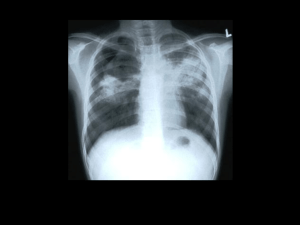
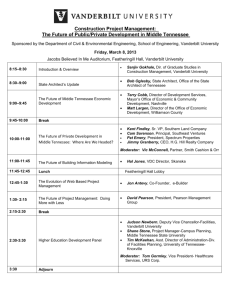

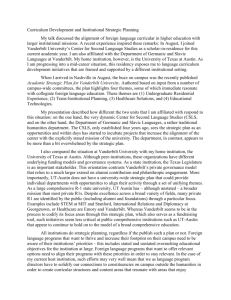
![Working Group on New Diagnostics Quiz []](http://s3.studylib.net/store/data/005832552_1-2f3950d800e81be53089eed30c91f80b-300x300.png)
